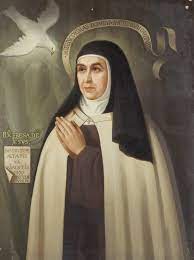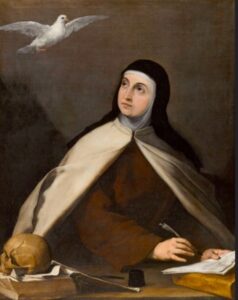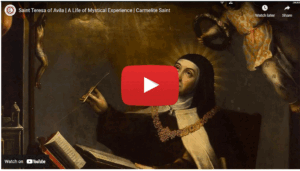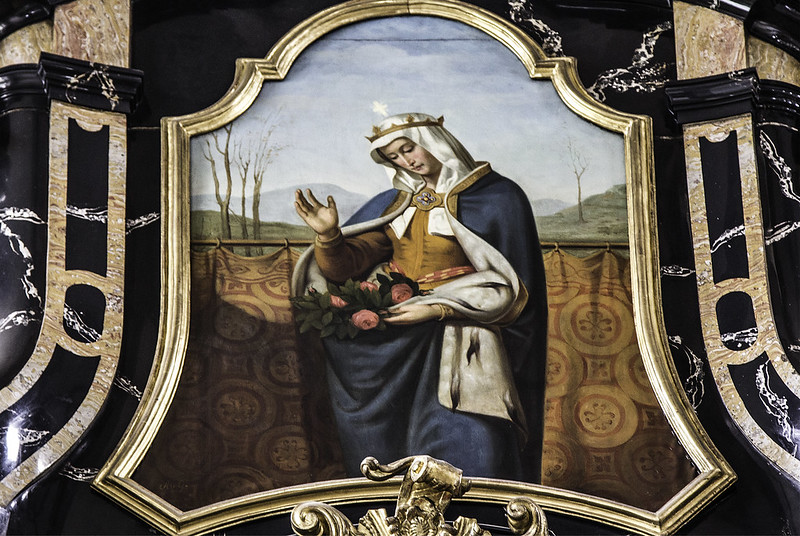


Teresa lived in an age of exploration as well as political, social, and religious upheaval. It was the 16th century, a time of turmoil and reform. She was born before the Protestant Reformation and died almost 20 years after the closing of the Council of Trent.
The gift of God to Teresa in and through which she became holy and left her mark on the Church and the world is threefold: She was a woman; she was a contemplative; she was an active reformer.
Teresa was a woman “for God,” a woman of prayer, discipline, and compassion. Her heart belonged to God. Her ongoing conversion was an arduous lifelong struggle, involving ongoing purification and suffering. She was misunderstood, misjudged, and opposed in her efforts at reform. Yet she struggled on, courageous and faithful; she struggled with her own mediocrity, her illness, her opposition. And in the midst of all this she clung to God in life and in prayer. she spent much of her time and energy seeking to reform herself and the Carmelites, to lead them back to the full observance of the primitive Rule. She founded over a half-dozen new monasteries. She traveled, wrote, fought—always to renew, to reform. In her self, in her prayer, in her life, in her efforts to reform, in all the people she touched, she was a woman for others, a woman who inspired and gave life.
In 1970, the Church gave her the title she had long held in the popular mind: Doctor of the Church. She and St. Catherine of Siena were the first women so honored.
Saint Teresa of Avila
QUOTES:
“Christ has no body now but yours, no hands, no feet on earth but yours.”
“It is love alone that gives worth to all things.”
“Prayer is nothing else than being on terms of friendship with God, frequently conversing in secret with Him.”
“Prayer is an act of love; words are not needed.”
Prayer of Saint Teresa of Avila
Lord, grant that I may always
allow myself to be guided by You,
always follow Your plans,
and perfectly accomplish Your Holy Will.
Grant that in all things, great and small,
today and all the days of my life,
I may do whatever You require of me.
Help me respond to the slightest prompting of Your Grace,
so that I may be Your trustworthy instrument for Your honour.
May Your Will be done in time and in eternity by me,
in me, and through me.
Amen.
Prayer of Saint Teresa of Avila
Let nothing disturb you,
let nothing frighten you,
all things will pass away.
God never changes;
patience obtains all things,
whoever has God lacks nothing.
God alone suffices.
Amen.
St. Teresa of Avila
O Saint Teresa, seraphic Virgin, beloved spouse of thy crucified Lord, thou who on earth didst burn with a love so intense toward thy God and my God, and now dost glow with a brighter and purer flame in paradise: obtain for me also, I beseech thee, a spark of that same holy fire which shall cause me to forget the world, all things created, and even myself; for thou didst ever avidly desire to see Him loved by all men. Grant that my every thought and desire and affection may be continually directed to doing the will of God, the supreme Good, whether I am in joy or in pain, for He is worthy to be loved and obeyed forever. Obtain for me this grace, thou who art so powerful with God; may I be all on fire, like thee, with the holy love of God.
Amen.
Growing Older
Lord, You know better than I myself
that I am growing older and will someday be old.
Keep me from the fatal habit of thinking
I must say something on every subject and on every occasion.
Release me from craving to
straighten out everybody’s affairs.
Make me thoughtful but not moody;
helpful but not bossy.
With my vast store of wisdom,
it seems a pity not to use it all;
but You know, Lord,
that I want a few friends at the end.
Keep my mind free from the recital of endless details;
give me wings to get to the point.
Seal my lips on my aches and pains;
they are increasing, and love of rehearsing them
is becoming sweeter as the years go by.
I dare not ask for improved memory,
but for a growing humility and a lessening cock-sureness
when my memory seems to clash with the memories of others.
Teach me the glorious lesson that occasionally I may be mistaken.
Keep me reasonably sweet, for a sour old person
is one of the crowning works of the devil.
Give me the ability to see good things in unexpected places
and talents in unexpected people;
and give, O Lord, the grace to tell them so.
Amen.
A Prayer of St. Teresa of Avila
Christ has no body but yours, no hands, no feet on earth but yours.
Yours are the eyes with which he looks compassionately on this world.
Yours are the feet with which he walks to do good.
Yours are the hands, with which he blesses all the world.
Yours are the hands.
Yours are the feet.
Yours are the eyes.
You are his body.
Christ has no body now but yours, no hands, no feet on earth but yours.
Yours are the eyes with which he looks compassionately on this world.
Christ has no body now on earth but yours.
Amen.
Thy Love for Me is Strong
If Lord, Thy love for me is strong
As this which binds me unto thee,
What holds me from thee Lord so long,
What holds thee Lord so long from me?
O soul, what then desirest thou?
Lord I would see thee, who thus choose thee.
What fears can yet assail thee now?
All that I fear is but lose thee.
Love’s whole possession I entreat,
Lord make my soul thine own abode,
And I will build a nest so sweet
It may not be too poor for God.
A soul in God hidden from sin,
What more desires for thee remain,
Save but to love again,
And all on flame with love within,
Love on, and turn to love again.
Saint Teresa of Ávila (also known as St. Teresa of Jesus) was one of the greatest mystics, reformers, and doctors of the Catholic Church. Her life and writings profoundly shaped Christian spirituality, especially in the Carmelite tradition.
Here’s a complete overview of her life and legacy
Saint Teresa of Ávila (1515–1582)
Feast Day: October 15
Patroness of:
- Spain
- Headache sufferers
- Religious and contemplative life
- Those seeking deep prayer and union with God
Early Life
- Born in Ávila, Spain, in 1515 to a deeply Christian family.
- From a young age, she was drawn to prayer and holiness. At age 7, she and her brother tried to run away to die as martyrs among the Moors — saying they wanted to “see God.”
- After her mother died, Teresa asked the Blessed Virgin Mary to be her mother — a turning point in her spiritual life.
Religious Vocation
- At 20, Teresa entered the Carmelite Convent of the Incarnation in Ávila.
- She soon fell ill, suffering from poor health most of her life, but found strength through deep prayer.
- Over time, she became disillusioned with the laxity she saw in her convent — too much comfort, too little focus on prayer.
- This led her to reform the Carmelite Order and return it to its original spirit of poverty, simplicity, and contemplation.
Reformer of the Carmelites
- Teresa founded the Discalced Carmelites (“discalced” means “barefoot”), emphasizing detachment, humility, and intense prayer.
- Despite strong opposition — even from Church authorities — she founded 17 convents across Spain.
- She worked closely with St. John of the Cross, who reformed the Carmelite friars in the same spirit.
- Her courage and trust in God earned her the title “a woman of steel wrapped in velvet.”
Mystical Writings
Saint Teresa was one of the most gifted writers on the interior life. Her works are spiritual masterpieces:
Main Works:
- “The Life of St. Teresa of Jesus” – her autobiography and account of her mystical experiences.
- “The Way of Perfection” – a guide for prayer and community life.
- “The Interior Castle” – her most famous work, describing the soul as a castle with seven mansions, each representing a deeper stage of union with God.
- “The Book of Foundations” – her story of establishing new convents.
In her writings, she describes profound mystical experiences, such as visions, ecstasies, and raptures, yet always emphasizes humility and obedience to the Church.
Her Spiritual Legacy
- Her spirituality centers on mental prayer, intimacy with God, and interior transformation.
- She often said:
“Prayer is nothing else than being on terms of friendship with God, frequently conversing alone with Him who we know loves us.”
- Teresa teaches that holiness is not about extraordinary visions but love and perseverance in daily life.
Canonization and Title
- Canonized by Pope Gregory XV in 1622, alongside St. Ignatius of Loyola, St. Francis Xavier, and St. Philip Neri.
- Declared a Doctor of the Church by Pope Paul VI in 1970 — one of the first two women to receive this title (along with St. Catherine of Siena).
Stay connected — subscribe today
https://www.youtube.com/@st.michaelusa
SIGN UP SO YOU CAN GET A BLESSING !
https://stmichaelcenter.flocknote.com/StMichaelCenter
FOLLOW US ON FACEBOOK !
https://www.facebook.com/StMichaelCenter/


 1015 St Teresa Avila 1p SMC 8.5 x 11 R1R 20240712
1015 St Teresa Avila 1p SMC 8.5 x 11 R1R 20240712 
 https://youtube.com/shorts/3iaNL_er2mA
https://youtube.com/shorts/3iaNL_er2mA













